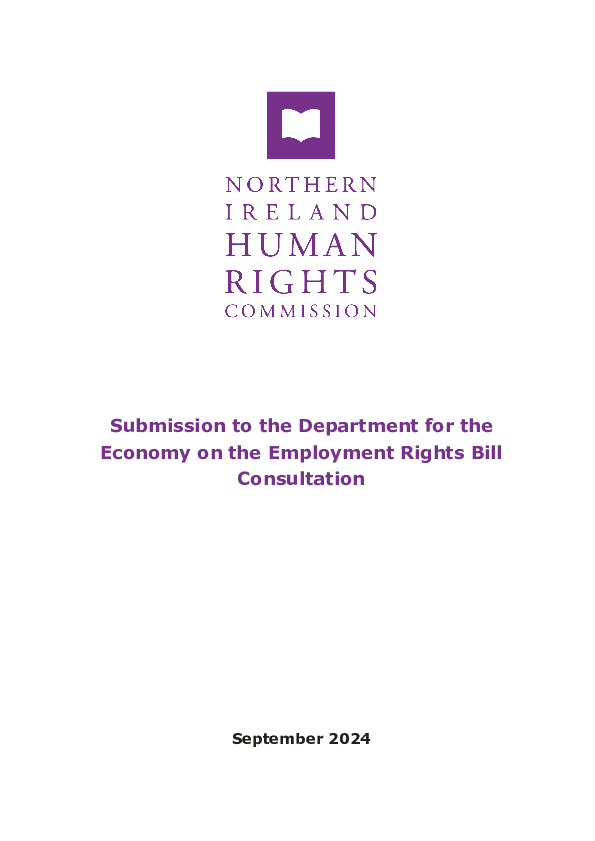NIHRC Response to the Department for the Economy Consultation on Employment Rights Bill
Date produced: September 2024
Below is a summary of the Northern Ireland Human Rights Commission's (NIHRC) recommendations and messages.
You can also download the full document through the links provided.
Summary recommendations/messages
2.8 that the Department for the Economy ensures the Employment Rights Bill reflects CJEU caselaw relating to the Annex 1 Equality Directives, in particular EU Employment Equality (Framework) Directive, in line with the decision of the CJEU in the cases of WABE and Müller.
2.14 that the Department for the Economy undertakes a human rights impact assessment of the draft Bill, including particular consideration of Windsor Framework Article 2.
2.15 that the Department for the Economy builds consideration of Windsor Framework Article 2 and the principles enshrined in the EU Charter of Fundamental Rights into the development and implementation of legislation and policy on employment rights.
2.21 that the Department for the Economy undertakes regular reviews of new EU laws relating to employment rights, with a view to ensuring employment law in NI reflects at least EU minimum standards, even where not required to do so under the Windsor Framework.
2.22 that the Department for the Economy considers the enhancement and harmonisation of employment law on the island of Ireland and works towards ensuring North-South equivalence of rights on the island of Ireland.
3.7 that the Department for the Economy, working with the NI Executive and NI Assembly, urgently bring forward legislation to amend NI law by June 2026, to ensure it keeps pace with those provisions of the EU Pay Transparency Directive that amend and/or replace provisions of the EU Gender Equality (Employment) Directive.
3.10 that the Department for the Economy, working with the NI Executive and NI Assembly, ensure the Employment Rights Bill amends the definition of discrimination in relevant NI employment equality law by June 2026, to include “intersectional discrimination” as required by the relevant provisions of the EU Pay Transparency Directive.
3.15 that the Department for the Economy works with the NI Executive and NI Assembly, to bring forward urgently legislation to ensure NI employment law is amended by June 2026, as required, to keep pace with the provisions of the EU directives on binding standards for equality bodies which amend and/or replace provisions in the Annex 1 Equality Directives.
3.18 that the Department for the Economy analyse the EU Directive on Combating Violence Against Women and consider if, or to what extent, it amends or replaces provisions the EU Gender Equality (Employment) Directive, and therefore engages the keeping pace obligation.
3.19 that, in addition to any changes required by the keeping pace obligation under the Windsor Framework, the Department for the Economy consider aligning on a voluntary basis with any enhancement to equality and human rights pursuant to the EU Directive on Combating Violence against Women and Domestic Violence.
4.7 that the Department for the Economy monitor closely any changes to the EU Employment Equality (Framework) Directive, the EU Racial Equality Directive, the EU Gender Equality (Self-Employment) and EU Gender Equality (Employment) Directives, to ensure that employment law in NI keeps pace with any enhancements to rights, pursuant to Windsor Framework Articles 2 and 13.
4.8 that the Department for the Economy reviews the proposed EU Directive on Platform Work and that, in addition to ensuring compliance of NI law with any dynamic alignment obligations arising, that it considers amending NI law on a voluntary basis, to align with other changes that enhance equality or human rights protections and reflect international human rights standards.
4.13 that the Employment Rights Bill must comply with minimum standards set out in the EU Directive on part-time work, pursuant to Windsor Framework Article 2.
4.20 that the ‘Swedish Derogation’ be abolished, as proposed by the Department.
4.21 that the Employment Rights Bill must comply with minimum standards set out in the EU Directive on Temporary Agency Work, pursuant to Windsor Framework Article 2.
4.26 that the Department for the Economy legislates as proposed, to require the provision of a Key Information Document to agency workers, to improve pay transparency and make pay-related information clearer and easier to understand.
4.27 that NI Employment law be amended to reflect at least the minimum requirements of the EU Pay Transparency Directive, in terms of access to pay information for part-time and agency workers, prior to employment and during the employment process, in line with Windsor Framework Articles 2 and 13.
5.6 that the Department for the Economy considers the EU Minimum Wages Directive to inform the Employment Rights Bill and guidance for improving collective bargaining on wage-setting in NI and that it considers amending NI law on a voluntary basis, to align with changes that enhance equality or human rights protections and reflect international human rights standards.
5.10 that the Department for the Economy reviews Northern Ireland public interest disclosure legislation in light of the EU Whistleblowing Directive, and considers amending NI law on a voluntary basis, to align with changes that enhance equality or human rights protections and reflect international human rights standards.
6.6 that the Employment Bill must comply with minimum standards laid out in the EU Pregnant Worker’s Directive.
6.12 that the Employment Bill must comply with minimum standards laid out in the EU Parental Leave Directive.
6.20 The NIHRC recommends that the Department for the Economy ensures that, on a voluntary basis, NI law aligns with those provisions of the EU Work-Life Balance Directive that enhance equality and human rights protections and align with international human rights standards.
Click here to open: NIHRC Employment Rights Bill Submission

Download Documents
Your browser is out-of-date!
Update your browser to view this website correctly. Update my browser now